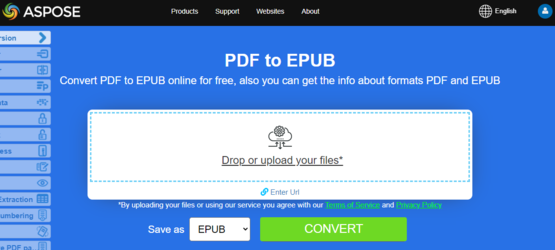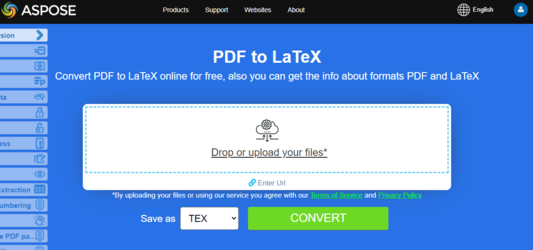Convert PDF file to other formats
Convert PDF to EPUB
Try to convert PDF to EPUB online
Aspose.PDF for C++ presents you online free application “PDF to EPUB”, where you may try to investigate the functionality and quality it works.
EPUB (short for Electronic Publication) is a free and open e-book standard from the International Digital Publishing Forum (IDPF). Files have the extension .epub. EPUB is designed for reflowable content, meaning that an EPUB reader can optimize text for a particular display device. EPUB also supports fixed-layout content. The format is intended as a single format that publishers and conversion houses can use in-house, as well as for distribution and sale. It supersedes the Open eBook standard.
Aspose.PDF for C++ also supports the feature to convert PDF documents to EPUB format. Aspose.PDF for C++ has a class named EpubSaveOptions which can be used as the second argument to Document.Save(..) method, to generate an EPUB file.
Please try using the following code snippet to accomplish this requirement with C++.
void ConvertPDFtoEPUB()
{
std::clog << __func__ << ": Start" << std::endl;
// String for path name
String _dataDir("C:\\Samples\\Conversion\\");
// String for input file name
String infilename("sample.pdf");
// String for output file name
String outfilename("PDFToEPUB_out.epub");
// Open document
auto document = MakeObject<Document>(_dataDir + infilename);
// Save PDF file into EPUB format
document->Save(_dataDir + outfilename, SaveFormat::Epub);
std::clog << __func__ << ": Finish" << std::endl;
}
Convert PDF to LaTeX/TeX
Aspose.PDF for C++ support converting PDF to LaTeX/TeX. The LaTeX file format is a text file format with the special markup and used in TeX-based document preparation system for high-quality typesetting.
To convert PDF files to TeX, Aspose.PDF has the class LaTeXSaveOptions which provides the property OutDirectoryPath for saving temporary images during the conversion process.
The following code snippet shows the process of converting PDF files into the TEX format with C++.
void ConvertPDFtoLaTeX()
{
std::clog << __func__ << ": Start" << std::endl;
// String for path name
String _dataDir("C:\\Samples\\Conversion\\");
// String for input file name
String infilename("sample.pdf");
// String for output file name
String outfilename("PDFToTeX_out.tex");
// Open document
auto document = MakeObject<Document>(_dataDir + infilename);
// Instantiate LaTex save option
auto saveOptions = MakeObject<LaTeXSaveOptions>();
// Set the output directory path for save option object
saveOptions->set_OutDirectoryPath(_dataDir);
// Save PDF file into LaTex format
document->Save(_dataDir + outfilename, saveOptions);
std::clog << __func__ << ": Finish" << std::endl;
}
Try to convert PDF to LaTeX/TeX online
Aspose.PDF for C++ presents you online free application “PDF to LaTeX”, where you may try to investigate the functionality and quality it works.
Convert PDF to Text
Aspose.PDF for C++ support converting whole PDF document and single page to a Text file.
Convert whole PDF document to Text file
You can convert PDF document to TXT file using TextAbsorber class.
The following code snippet explains how to extract the texts from the all pages.
void ConvertPDFDocToTXT()
{
std::clog << __func__ << ": Start" << std::endl;
// String for path name
String _dataDir("C:\\Samples\\Conversion\\");
// String for input file name
String infilename("sample.pdf");
// String for output file name
String outfilename("input_Text_Extracted_out.txt");
// Open document
auto document = MakeObject<Document>(_dataDir + infilename);
auto ta = MakeObject<TextAbsorber>();
ta->Visit(document);
// Save the extracted text in text file
System::IO::File::WriteAllText(_dataDir + outfilename, ta->get_Text());
std::clog << __func__ << ": Finish" << std::endl;
}
Convert PDF page to text file
You can convert PDF document to TXT file with Aspose.PDF for C++. You should use TextAbsorber class for resolve this task.
The following code snippet explains how to extract the texts from the particular pages.
void ConvertPDFPagestoTXT()
{
std::clog << __func__ << ": Start" << std::endl;
// String for path name
String _dataDir("C:\\Samples\\Conversion\\");
// String for input file name
String infilename("sample-4pages.pdf");
// String for output file name
String outfilename("sample-4pages_out.txt");
// Open document
auto document = MakeObject<Document>(_dataDir + infilename);
auto ta = MakeObject<TextAbsorber>();
auto pages = { 1, 3, 4 };
try {
for (auto page : pages)
{
ta->Visit(document->get_Pages()->idx_get(page));
}
// Save the extracted text in text file
auto text = ta->get_Text();
System::IO::File::WriteAllText(_dataDir + outfilename, text);
}
catch (Exception ex) {
std::cerr << ex->get_Message() << std::endl;
}
std::clog << __func__ << ": Finish" << std::endl;
}
Try to convert Convert PDF to Text online
Aspose.PDF for C++ presents you online free application “PDF to Text”, where you may try to investigate the functionality and quality it works.
Convert PDF to XPS
Aspose.PDF for C++ gives a possibility to convert PDF files to XPS format. Let try to use the presented code snippet for converting PDF files to XPS format with C++.
The XPS file type is primarily associated with the XML Paper Specification by Microsoft Corporation. The XML Paper Specification (XPS), formerly codenamed Metro and subsuming the Next Generation Print Path (NGPP) marketing concept, is Microsoft’s initiative to integrate document creation and viewing into the Windows operating system.
To convert PDF files to XPS, Aspose.PDF has the class XpsSaveOptions that is used as the second argument to the Document.Save(..) method to generate the XPS file.
The following code snippet shows the process of converting PDF file into XPS format.
void ConvertPDFtoXPS()
{
std::clog << __func__ << ": Start" << std::endl;
// String for path name
String _dataDir("C:\\Samples\\Conversion\\");
// String for input file name
String infilename("sample.pdf");
// String for output file name
String outfilename("PDFToXPS_out.xps");
// Open document
auto document = MakeObject<Document>(_dataDir + infilename);
// Instantiate LaTex save option
auto saveOptions = MakeObject<XpsSaveOptions>();
// Save PDF file into XPS format
document->Save(_dataDir + outfilename, saveOptions);
std::clog << __func__ << ": Finish" << std::endl;
}
Try to convert PDF to SVG online
Aspose.PDF for C++ presents you online free application “PDF to XPS”, where you may try to investigate the functionality and quality it works.



